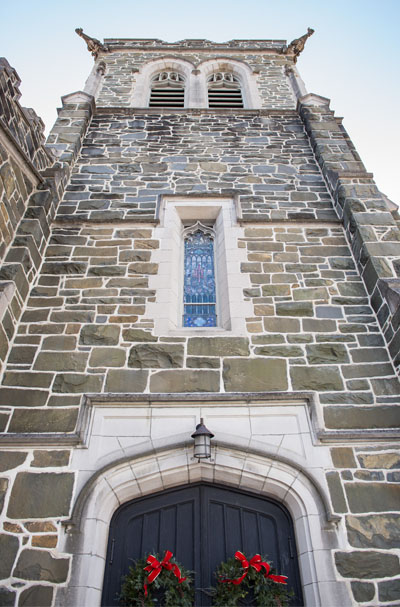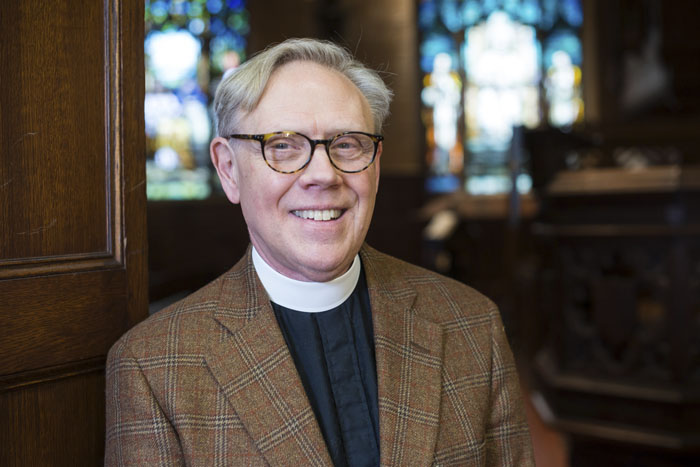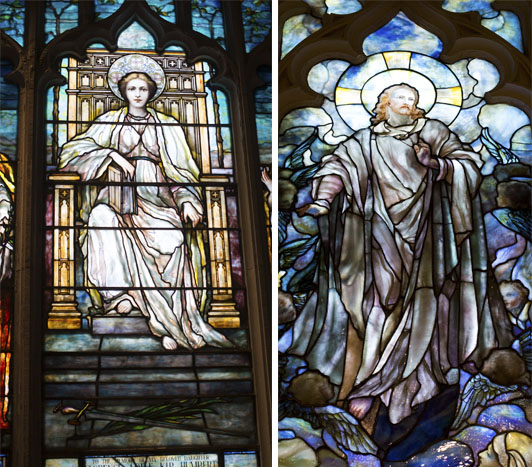
(Photos by Dion Ogust)
The first Episcopal services were conducted in Rhinebeck in 1831, and the congregation of the Church of the Messiah was somewhat nomadic for two decades until its first church (now the Catholic Church of the Good Shepherd) was built in 1853. When a new property was donated by two vestrymen, along with proceeds from the sale of a home owned by Colonel John Jacob Astor, construction began in 1896 to erect the Montgomery Street building that has since been home to the congregation. The Church of the Messiah was consecrated in 1899, and congregants included several very wealthy community members who served as benefactors. When the RMS Titanic sank in 1912, Astor and many other members of the Rhinebeck community were on board and did not survive. In 1921, the colonel’s son, Vincent Astor, donated an impressive E. M. Skinner pipe organ to the church in memory of his father.
Problems related to water infiltration through the roof and walls were already apparent shortly after the church opened its doors and, in fact, a letter from Vincent Astor stated that the water problem would have to be fixed before he would give the organ. Today, Father Richard McKeon, who previously served for many years at an Episcopal church in Dobbs Ferry and has been the Messiah’s rector since 2010, says, “When you look at the closeup photographs of the wiring and the stone, it’s pretty scary, although it still looks pretty good from 100 feet away. The people of this church have been very faithful about maintaining it and were not neglectful, but systemic problems were there since the first year.”

Father Richard McKeon, who has been the Church of the Messiah’s rector since 2010, says, “People ask me, ‘Why save the building?’ and I say we have a beautiful building and it has a place in the community.”
A six-million-dollar capital campaign to restore the church and the organ – the first in the church’s history – kicked off in October and will continue into the New Year. To date, about 35 pledges have garnered more than $1.2 million, and Father McKeon acknowledges that the goal is a hefty one. “But,” he says, “we’re optimistic. We hope for another 110 pledges from our parish. People ask me, ‘Why save the building?’ and I say we have a beautiful building and it has a place in the community. I tell them, ‘I’ve fallen in love twice since coming here: once with all of you, and then with the building.’”
Father McKeon loves the church’s architecture, and is particularly enthusiastic about the caliber of the Tiffany stained-glass windows, which are targeted for protection and preservation in the restoration project. “Any good work of art tells a story, and that makes your experience of the art more profound,” he says. “The symbolism of the content and the work of art draws you into it; and like any great work, your experience of it changes over time.”
Restoration of the church’s treasured pipe organ is another cornerstone of the capital campaign, as it is integral to the church’s offerings to its congregation, as well as to the community. The E. M. Skinner organ at the Church of the Messiah is one of 700 organs built by the company before 1930. The instruments were known, says the church’s music director Tim Lewis, “as the Rolls Royce of their day. There are larger organs in much larger churches – such as at St. John the Divine and St. Thomas on Fifth Avenue, churches that accommodate 800 to 1,000 people – but ours is well-adapted to our space, which holds about 250 people. It was so well-built that it still functions and sounds as it did when it was new.”


Rhinebeck’s Church of the Messiah is also known for its stellar acoustics and music program directed by Tim Lewis (shown top, playing the Skinner organ). “I’m the only person who sees people’s faces and their looks of amazement and joy when they hear Tim play,” says Father Richard McKeon.
Many of the original E. M. Skinner organs have been modified, but the Messiah’s is one of only four or five that were not been adapted or updated during last century’s Baroque music revival. “Organs have changed a lot over time, and in the 1960s, people wanted to play Bach and other German and European music. It was not the best instrument, tonally, to do that; and so, for better or for worse, a lot of these organs were modified. But in the 1950s and 1960s, Rhinebeck was just far enough off the grid that, when others were rebuilding or throwing out these organs or replacing them with an electronic substitute, this congregation did not. They always cared about it; and historically, it’s a gem. It sounds as it did 100 years ago as a touchstone, a point of reference,” says Lewis, adding that it still functions well, despite being made of largely natural materials – tin, lead, metal and wooden pipes, leather, copper contacts for the keys and antique magnets that sit inside the wooden chests (that supply wind to the pipes) – that are especially vulnerable to water damage. Historically, it represents technology that was complicated according to 1910 standards, and its preservation is important for that reason, as well as the fact that it sits at the heart of the church.
The church’s beauty and stellar acoustics have made it a focal point for events and services such as weddings and funerals, as well as for concerts by the Rhinebeck Chamber Music Society, Sinterklaas festivities and other gatherings. The Messiah is renowned for its church music program, which Father McKeon calls extraordinary, adding, “I’m the only person who sees people’s faces and their looks of amazement and joy when they hear Tim play. Episcopal services are beautiful, and people look swept away with joy or awe.”
“When the organ was originally installed, the church began a Choir School for Children, and our intention was to do teaching,” he continues. “We are open now to establishing a sacred music program at Messiah, in collaboration with one of the local colleges, as a satellite program for music and organ scholars.” Graduate students in the Vocal Arts program at Bard College, for example, must do a community music program as part of their studies, and baritone Nathaniel Sullivan just did a song recital at the Hudson Opera House as a benefit for the Church of the Messiah’s food pantry.
“Two current Bard students and two who have graduated sing with us in our choir every week. Having these young people involved here at the church is sending our music in a slightly different direction. Our regular 10 a.m. Sunday service is entirely choral music and a bit all over the map,” says Lewis. “The Episcopal Church is grounded in Anglican traditions, but we also perform music of Duke Ellington, music from South Africa and some African American spirituals. The main thing, for me, is there is not just one way to approach God musically and to think about approaching God spiritually with music. There’s no ‘one size fits all,’ and people who come to us relate to music – whether it’s from South Africa, Asia or France. On any given Sunday, I try to make sure there’s something here for everyone.”
Lewis worked as music director in an Episcopal church in downtown White Plains for 25 years before coming to Rhinebeck to take on the position of music director and to join his life partner, Father McKeon, in 2015. “Our Hudson River communities are changing,” he says. “There are people who have lived here for a long while, and new people who think it’s pretty nifty here and have moved up from New York City.”

The church is known for the high caliber of its Tiffany stained-glass windows.
The congregation in Rhinebeck has a long tradition of being directly involved in the community and sees a diversity of community programming as a part of its ministry and its identity, says Father McKeon. “As an openly gay rector, I wanted to be in a parish that was open to a close and authentic relationship with their priest. [Tim’s and my presence here] is seen as something that makes our claim to be a welcoming congregation more real. Rhinebeck is a progressive place.”
The church operates a large food pantry. In 2015, 42 volunteers – including drivers who picked up between 4,000 and 5,500 pounds of food each month in Kingston – served 309 households (compared to 280 in 2014) and distributed enough food for more than 37,000 meals, as well as holiday supermarket gift cards and gift bags. They also provided 280 warm coats and jackets to Dutchess County residents, as well as hats, scarves and mittens for schoolchildren.
The church’s Cuddle Blanket program ensures that each child who arrives at Camp Ramapo in the summer receives a quilt, and 130 quilts were donated in 2015. Messiah’s English as a Second Language (ESL) tutors have conducted weekly classes for more than a decade; a program specific to the Hispanic population in Rhinebeck will be initiated in 2017. Its Storybook Program at the Dutchess County Jail allows parents who are inmates to make a recording while reading a book so that their children, who receive the book and recording, may listen to their parent while following along.
The Rural Migrant Ministry program offers financial support and Christmas gifts to local families, and the church’s Sister City program assists elderly women in Nicaragua. A Third Thursday luncheon program feeds about 100 to 120 people and raises funds for a men’s shelter in Poughkeepsie; the Grace Smith House, a domestic violence shelter for women and children; the ASPCA; the Loft; homeless people; gay/lesbian runaways and others who need support. A new Liturgical Art Program based on Father McKeon’s assertion that “All Are Welcome at Our Table” has inspired the creation of several banners in support of inclusivity.
Speaking of inclusivity, Lewis encourages people to get in touch with him if they’re interested in singing in the choir at Messiah. “A musician of Tim’s caliber draws people to the church,” says Father McKeon. “As for me, the people here are so engaging, and committed to a life of faith, justice and spirituality. This is the perfect job for me: It builds on all I’ve done in 31 years as a priest and all the things I hadn’t been able to fully explore before. I’m very happy here.”
The Episcopal Church of the Messiah, located at 6436 Montgomery Street in Rhinebeck, offers Thursday services at 10 a.m. in the Tyler Chapel, Children’s Sunday School at 9:45 a.m. and Sunday services at 8 and 10 a.m. For more information, visit www.rhinebeck-episcopal.org or call (845) 876-3533.
